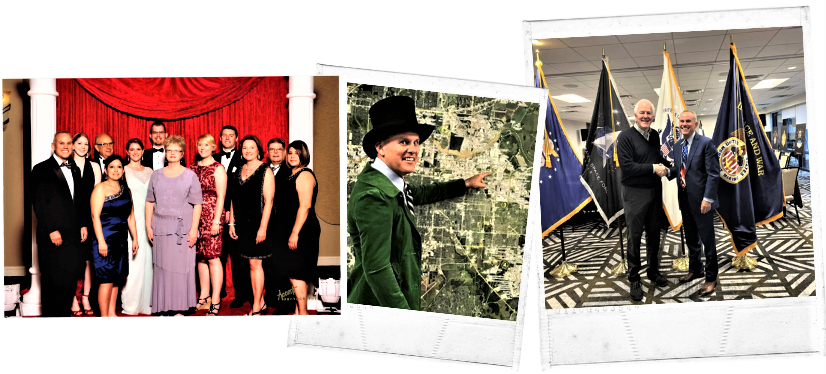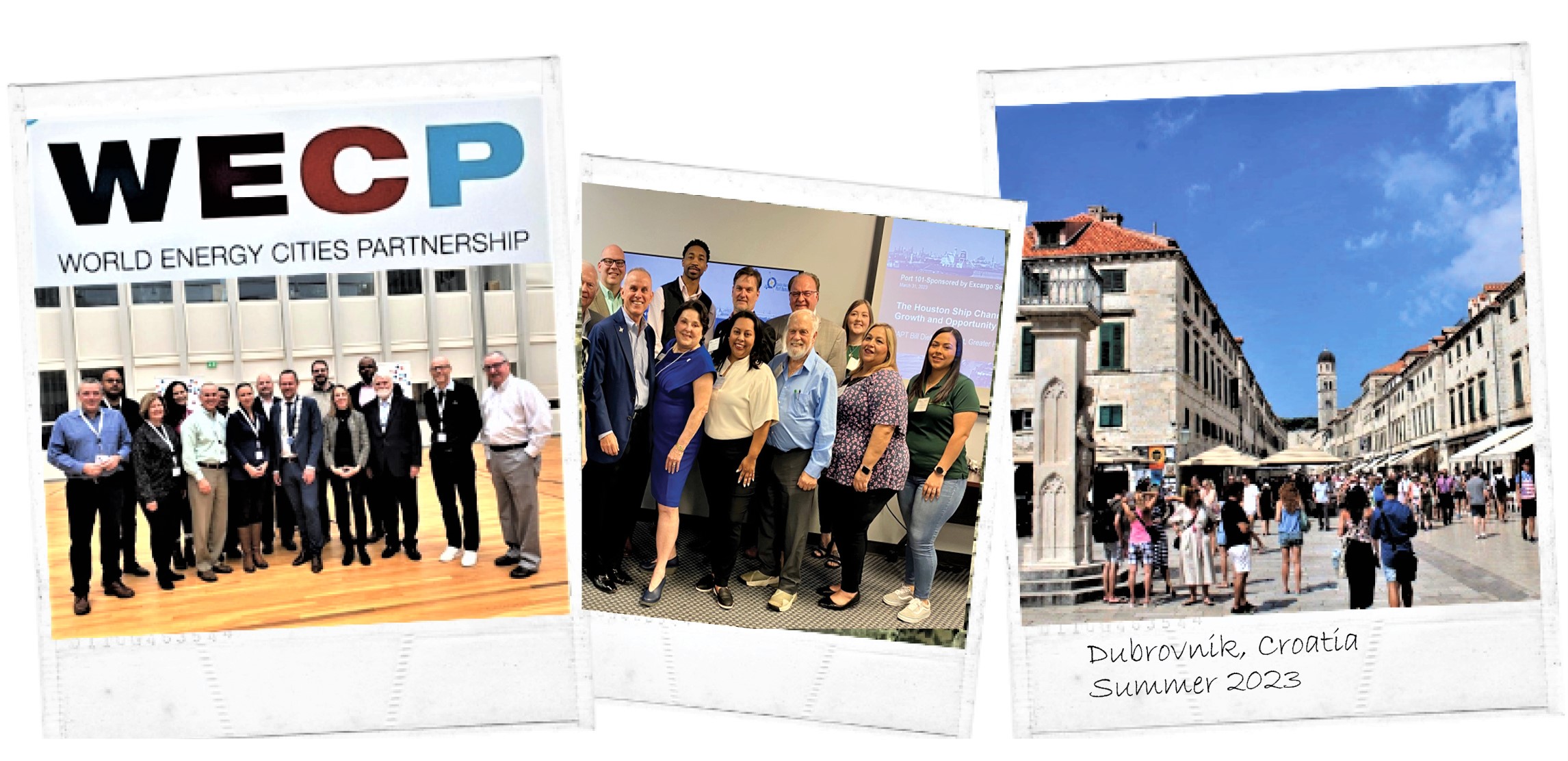CAPT Bill Diehl Carries ‘No Excuse, Sir’ Attitude into Retirement
CAPT Bill Diehl, retiring president of the Greater Houston Port Bureau, chats about his maritime career and what might be written into his next chapter.

CAPT Bill Diehl, USCG (Ret.), will close his long chapter as a full-time maritime professional on May 18, 2023. He then will focus on finding out if Mondays really can become Fundays – mostly likely on the golf course. He hasn’t decided yet, but one thing is certain. He will take the attitude of “No excuse, sir!” into retirement.
For 17 years, Bill has brought this energetic philosophy into his work in Houston’s vast port community. It’s proved effective because he served the Sector Houston-Galveston with distinction and now leaves the Port Bureau flourishing in membership and thriving in its work with members to collaborate on the initiatives that impact everyone in the port region. Bill also leaves it in skilled hands. The Port Bureau’s knowledgeable and experienced staff will be led by Captain Eric Carrero when he takes the helm as president on July 1.
Bill first learned the “No excuse, sir!” reponse in 1978 when he arrived at the Coast Guard Academy fresh out of high school. He was met by second class cadets (his superiors) who rattled him with their taskings and questions. He quickly learned that “I don’t know” was never an acceptable answer. Rather, the accepted response was “No excuse, sir or ma’am,” for jobs not completed or unknown answers.
Utter the phrase, and Bill could go on his way by feigning to accept responsibility for his shortcomings. He latched onto it with a kind of youthful audacity and used it frequently. Whether the question was trivial or complex, when he answered “No excuse, sir!,” his superiors left him alone and didn’t ask the question again. Years later, after he graduated from the University of Michigan, the true meaning of the drilled response came home to him. When it did, it was an eye-opener.
“The captain came in and asked me for my opinion on whether a damaged ship would break in half if they moved it from Alaska to California. I puffed up and gave a lot of excuses why that would be a pure guess. When I was done, the captain turned to the officer next to me and asked the same question. His reply was that he was on it. That captain never asked me for my opinion again,” recalls Bill.
He realized he had only pointed out the obvious problems and posed no solution for getting the job done – and it had to be done. Suddenly, he understood that “No excuse, sir!” meant that not having a way forward or a suggestion to help was unacceptable. Never being asked for his input again was a consequence rather than the perk he thought it was at the Academy. It was his moment of clarity about his career – and about life.
A year later the scenario replayed itself. Bill flew to Texas to respond to a ship on fire off the coast of Galveston. A different captain entered the room and asked the naval architect next to him if the ship was going to break in half from the firefighting efforts. He replied to captain that it would be a guess. The captain turned to Bill, and this time he was ready—he said “I’ll give it my best shot”. The trajectory of Bill’s Coast Guard career changed that day—he became a go-to guy for solving problems. He has continued with the “No excuse, sir!” mindset to this day.

It is not surprising that Bill came to that important level of clarity. His father was a chemistry professor at St. Bonaventure University who valued learning and problem-solving. He quizzed his nine children daily on a wide variety of topics as a part of their dinner table discussions and read to them from the Great Books. “Dad taught me to find out; not just guess,” Bill recalls.
His mother was a highly accomplished registered nurse and instructor whom Bill can’t remember ever voicing a complaint. His parents expected each of their children to take classes from the most challenging teachers and learn life sports. By word and deed, they coached each child to get all they could out of every life experience.
Bill graduated from the Coast Guard Academy in 1982 and went on to specialize in the Coast Guard’s marine safety field. He served in assignments in California, Louisiana, Michigan, Washington, D.C., Minnesota, Hawaii, Panama, and Texas (twice). Along the way, he earned his master’s degree in naval architecture, marine engineering, and mechanical engineering from the University of Michigan.
It was in Duluth, Minnesota, that Bill became a storyteller. There, he applied his “No excuse, sir” approach to learn public speaking. “I was the Captain of the Port and was expected to speak publicly often. I had done little public speaking up to that point and was terrible at it. I went to Toastmasters and learned that I was good at speaking when I wrapped my message around a story. It felt natural and helped me to get my message across in an effective way,” he says.
It was a needed skill because he was destined to communicate some significant messages in the years to come. Bill arrived in Houston from an overseas assignment as a diplomatic liaison officer at the Panama Canal in July of 2006 to assume Captain of the Port (“COPT”) command. Panama had been an adventure of its own, but Sector Houston-Galveston was a whole new ball game. The area of responsibility extends from Lake Charles to Freeport and includes seven major ports, not the least of which includes the largest manufacturing complex in the Western Hemisphere.
How to handle this complicated, sprawling industry group? Bill wasn’t about to have any excuse and he sought out information. He credits CAPT Frank Paskewich, a friend from New Orleans, for offering some surprisingly sage counsel: Think of it like a gigantic bowl of Jell-O, with industry scattered on top of it.
“Frank told me as COTP, I would periodically have to implement new regulations or change processes due to incidents, which shakes things up. It was important not to shake too hard – or industry (pieces on the top of the bowl) start to bounce around and crash into each other,” explains Bill. “He told me this would result in upsetting the community I was serving, and I needed their support to accomplish my job.”
The next piece of advice that supported him was from local industry leader, Jim Overman, who told him: “It is not in our interest to watch you fail; the consequences to everyone are just too great.” Bill believed Jim and trusted industry would help. It provided a strong foundation for carrying out his mission to work with industry to improve port safety, security, and caring for the environment.

Coming to the Port Bureau in September of 2009, Bill carried his “No excuse, sir!” mantra with him as he explored new direction for the Port Bureau.
“We began by marketing an ‘Ask the Captain’ service,” Bill says. “If you had a question—any question, you could call us. We didn’t give you any excuse or tell you we didn’t know. We called around and researched it until we could give you something you could use.”
Companies began to see value in what Bill and the Port Bureau were doing, and it changed the Port Bureau’s role in the port. When it came to the Port Bureau’s mission, Bill leaned on the lessons learned when serving as COTP: shake gently and get help from industry. He realized anyone working solo on port-wide goals made little progress, but multiple companies “shaking gently” together for needed change offered unlimited potential for success.
This key message resonated in the port community. Bill cultivated an atmosphere that encouraged the needed collaboration and trust among members, sometimes in competition with one another, to push forward to reach port-wide goals.
“I could see the Port Bureau solving problems and was very happy to be a part of something that was catching on and showing benefits. Our goal was for us to meet often and see the sense of community grow,” said Bill.
As an organization, the Port Bureau has significantly gained in membership, growing from 95 to over 250 companies. It expanded its business information and networking events, hosted port education sessions, like Port 101, and furthered advocacy for dredging, Project 11, and coastal protection. We’ve also promoted port call digitization objectives through the Port Bureau’s PilotTracker real-time vessel tracking and Synchronizer programs.
With the Port Bureau’s future looking bright, Bill decided it was time for him to look to his own future. He enjoys and admires the Port Bureau staff and the work we do together, but decided his “grandpa duties” were calling and he wanted time to try new things.
“My dad’s approach to retirement is a roadmap for me,” says Bill. “He focused on keeping disciplined in body, mind, and spirit. I want to improve my golf game and work on my Spanish and faith. We will be staying in Texas, but we plan to travel, I really enjoy having adventures with others.”
His first stop? Croatia. Bill and his wife, Annette, will join a lively group of 20 this summer for a cruise down the coast of Croatia. But it won’t be lazing on the beautiful beaches for these visitors. Each day will see them biking to onshore sites to explore the country’s superb landscape and rich history.
After that? His daughter’s family will be returning to Texas to live in the Austin area. This makes the grandkids a short hop away, and there are plenty of adventures to be had with them. Perhaps he’ll read the Great Books to them in Spanish. All in all, we are certain of this: whether retirement finds him on the golf course, puzzling the grandkids, or trekking to parts unknown, Bill will have “No excuse, sir!” for not making the most of it.
